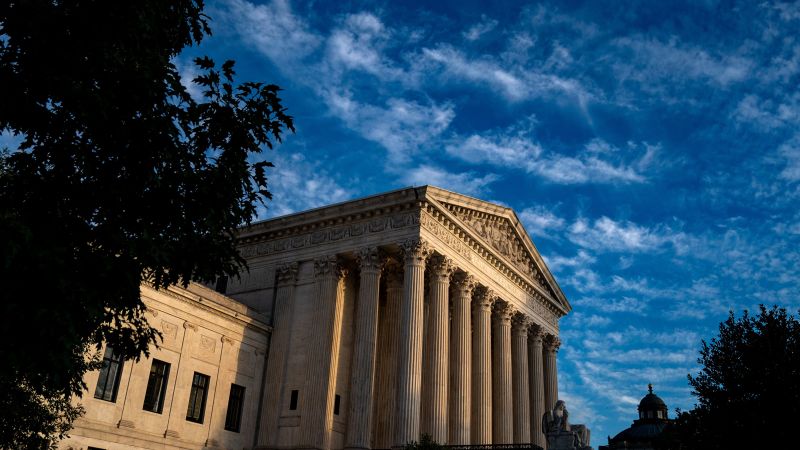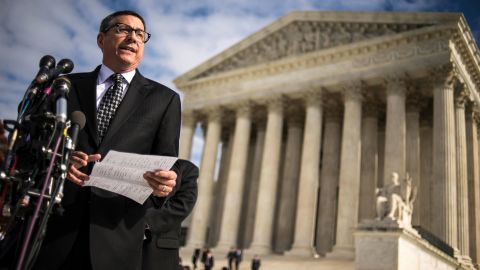
CNN
—
A former evangelical activist claimed in a letter to the Chief Justice of the United States that he knew about the outcome of a 2014 Supreme Court decision involving contraception and the Affordable Care Act by the court prior to the formal announcement, according to The New York Times.
Rev. Rob Schenck wrote in the letter this summer to Chief Justice John Roberts, which was originally obtained by the Times, that he was informed by a wealthy political donor, Gayle Wright, about the verdict of the ruling prior to it coming out.
According to the letter dated in June of this year but not sent until the following month, Wright had dinner with Justice Samuel Alito and his wife and spoke of the upcoming ruling at the time.
“She suggested that in their table conversation, she might be able to learn the status of the case, something she knew I had an interest in knowing. I received a follow-up message from her notifying me she has indeed obtained the information during that visit. We spoke on the phone, and she detailed the revelation,” Schenck wrote, according to the Times.
A source close to Schenck confirmed the letter to CNN.
“Mr. Schenck confirms the extensive details and facts he provided regarding these events.” the source told CNN.
Schenck said in a statement sent to CNN on Saturday that he was motivated by “truth-telling, which should be at the heart of Christian faith and practice.”
“My behind-the-scenes role at the Supreme Court and that of my cohorts are tangential to my purpose in coming forward,” he said. “I think it’s time for the Court, all of the government, and society to examine what we mean by ethics, justice, and accountability. Still, it’s even more critical for those of us who call ourselves Christians to do so.”
The 2014 ruling involved the case of Burwell v. Hobby Lobby. A 5-4 court held that closely held family-owned corporations like Hobby Lobby could not be required to pay insurance coverage for certain types of contraception under the Affordable Care Act without violating a federal law aimed at protecting religious freedom. Alito authored the opinion.
Alito, in a statement provided to CNN by the Supreme Court on Saturday, called the allegations concerning the dinner conversation “completely false.”
“My wife and I became acquainted with the Wrights some years ago because of their strong support for the Supreme Court Historical Society, and since then, we have had a casual and purely social relationship. I never detected any effort on the part of the Wrights to obtain confidential information or to influence anything that I did in either an official or private capacity, and I would have strongly objected if they had done so,” Alito said.
Wright vehemently denied Schenck’s claims in an interview with CNN on Saturday.
“This whole thing is unbelievably misconstrued,” she said, adding that Alito would never have discussed a specific case and she would never have asked about one.
“Cases are never discussed, everybody knows that,” she said.
Wright confirmed to CNN the she and her husband had dined with the Alitos at their home and she remembered falling ill during the dinner and Alito offering to drive her home. It was the only time she had dined at the justice’s home, but she said she has seen him occasionally over the years. She called any allegation that they had discussed the outcome of a case “patently not true.”
A source told CNN on Saturday that Schenck never heard back from the court about his letter.

Schenck said in the letter that he was sharing the information now to assist in the ongoing investigation into the leaked draft of the opinion that overturned Roe v. Wade. The Times report said that “Mr. Schenck’s account of the breach has gaps” but that a series of emails and conversations imply he knew the outcome of the case ahead of the public ruling.
“Considering there may be a severe penalty to be paid by whoever is responsible for the initial leak or the recent draft opinion, I thought this previous incident might bear some consideration,” he wrote.
The draft opinion in this year’s Dobbs v. Jackson Women’s Health Organization case was written by Alito and appeared to have a five-justice majority to reverse the 1973 Roe v. Wade decision. Politico obtained and reported on the draft opinion in early May, and the leak that rocked the court was the cause for protests around the nation. The official Dobbs ruling overturning Roe came out in late June.
The unprecedented investigation into the breach of confidentiality at the nation’s highest court prompted sudden requests for private cell data from law clerks but there has been a lack of transparency about where things currently stand, and the possibility of a previous leak could be damaging to the court for which public trust is already at a record low.
Brian Fallon, the executive director of the liberal group Demand Justice, called Saturday for the Senate Judiciary Committee “to investigate the apparent leak.”
“The whistleblower in this report, Rev. Rob Schenck, should be called to testify about both the leak and the yearslong lobbying effort he once led to cultivate Alito and other Republican justices,” Fallon said in a statement.
Committee Chairman Dick Durbin said the panel “is reviewing these serious allegations, which highlight once again the inexcusable ‘Supreme Court loophole’ in federal judicial ethics rules.” The Illinois Democrat called for the passage of a proposal from Sen. Chris Murphy (D-Connecticut) that would require the Supreme Court to adopt a code of ethics for justices.
“It is unacceptable that members of the highest court in the land are exempted from the judicial code of ethics when wealthy special interests are spending millions of dollars in dark money to influence the Court’s decisions,” Durbin said in a statement on Saturday.
CORRECTION: An earlier version of this story included a misspelling of Rob Schenck’s last name.
